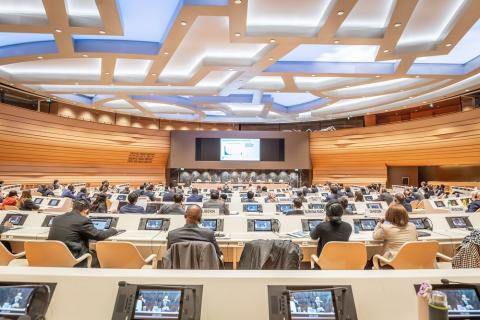
UNITAR Online Catalogue
Science Diplomacy and Informed Decision-Making during our Global Pandemic

Multilateral Diplomacy
Contexte
In our transboundary world, applications with science diplomacy originate and operate inside as well as outside of government with connections that exist at all scales on earth, revealing two cross-cutting questions. How does science enable allies and adversaries alike to build common interests? How can science promote cooperation and prevent conflict?
From our industrial and digital revolutions into the future, these questions underscore the stimulus for science diplomacy as a holistic process to address issues, impacts, and resources across time and space in our globally-interconnected civilization. In relation to current decisionmaking, it is understood that human impacts are related to populations, affluence, and technology.
But, with all kinds of biophysical and socioeconomic “evidence” for decisions from diverse stakeholders, how do we make informed decisions? How can uninformed decisions be detected and corrected? How can informed decision-makings be compatible with science diplomacy? How does a global pandemic such as COVID-19 influence decision-makings and science diplomacy?
Objectifs d'apprentissage
This course will introduce Science Diplomacy as an international, interdisciplinary and inclusive (holistic) process, involving informed decisionmaking to balance national interests and common interests for the benefit of all on Earth across generations. It will enhance the capacity of participants to contribute to informed decisionmaking, operating with scalability across a ‘continuum of urgencies’ that extends from security to sustainability time scales at national and international levels.
After successful completion of this module, participants should be able to:
• Understand the context of our globally-interconnected civilization across the 21st century
• Contrast informed and un-informed decisions from diverse perspectives
• Apply common-interest building as a negotiating strategy, starting with questions
• Contribute as a ‘science diplomat’ with balance for the benefit of all at local-global and global-local levels
• Grasp the compatibility of informed decision-makings and science diplomacy in response to a global pandemic such as COVID-19
Contenu et structure
In our rapidly changing world, diplomats and governments cannot afford to stay behind. The e-Learning course on Science Diplomacy and Informed Decision-Making during our Global Pandemic will provide them with competitive edge and all necessary knowledge to effectively navigate the cross-section of science diplomacy and informed decision-making in crisis.
The e-Learning course provides a broad overview on science diplomacy, preparing the participants for the challenges and opportunities in this field. It is one week of length and the materials on UNITAR’s e-Learning platform can be studied in a self-paced manner. The course will contain the following modules:
- Module 1.0. - Science Diplomacy As An Holistic Process
- Module 2.0. - Engine of Science Diplomacy -Informed Decisionmaking (Theory)
- Module 3.0. - Informed Decisionmaking (Methods)
- Module 4.0. - Engine of Science Diplomacy - Informed Decisionmakin (Skills)
- Module 5.0. - Common-interests Building
Alongside multimedia metarial and discussion fora, there will be two 1,5 hour live webinars with the instructor, Prof. Paul Arthur Berkman, Director of the Science Diplomacy Centre at the Fletcher School, Tufts University.
Audience cible
This e-Learning course is aimed at introducing the concept to the wider public and raising awareness in the international community about the present and upcoming related challenges and opportunities facing diplomats and international affairs professionals over a global pandemic.
For this reason, the e-Learning course is mostly geared towards diplomats, foreign ministry officials and policy makers. Public sector officials, private sector professionals and representatives from NGOs, think tanks or academia, junior professionals and graduate students are equally welcome to apply.
In order to stay abreast of the quickly changing landscape, each edition of the course will be evaluated and adapted to the newest developments in the field. In the long run, the course will also be complemented by high-level panels, field-visits, interactive discussions and a master’s degree.